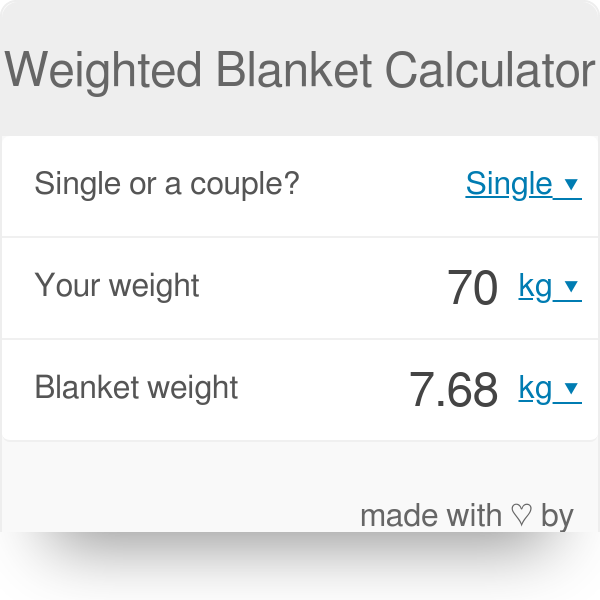To calculate the weight for a weighted blanket, use a simple formula: 10% of your body weight plus 1 to 2 pounds. For example, if you weigh 150 pounds, your ideal weighted blanket would be 16 to 17 pounds.
Weighted blankets have gained popularity for their therapeutic benefits of reducing anxiety and improving sleep quality. When selecting a weighted blanket, determining the right weight is crucial for achieving the desired calming effect. By following the formula based on your body weight, you can ensure that the weighted blanket provides the optimal pressure to help you relax and unwind after a long day.
It’s important to consider this factor when choosing a weighted blanket to maximize its benefits for your well-being.
Choosing The Right Weighted Blanket
Finding the perfect weight for your weighted blanket is crucial for optimal comfort and effectiveness. Follow our simple guide to calculate the ideal weight so you can experience the soothing benefits of this popular sleep aid.
Considerations For Weighted Blanket Weight
Before purchasing a weighted blanket, it is essential to consider various factors that influence the weight selection.
- Body Weight: Choose a blanket that is around 10% of the user’s body weight.
- Personal Preference: Individuals may prefer different weights based on comfort level.
- Medical Conditions: Consult with a healthcare provider for specific recommendations.
Calculating the proper weight for a weighted blanket can ensure optimal effectiveness and comfort.
| Body Weight | Ideal Blanket Weight |
|---|---|
| 40-70 lbs | 4-7 lbs |
| 70-120 lbs | 7-12 lbs |
| 120-180 lbs | 12-18 lbs |
| Above 180 lbs | 18+ lbs |

Credit: hush.ca
Factors To Consider
When it comes to calculating the right weight for a weighted blanket, there are several factors to consider. It’s important to take into account the individual’s body weight and the recommended weight percentage for the blanket. By understanding these factors, you can ensure that the weighted blanket provides the desired therapeutic benefits.
Individual’s Body Weight
The weight of the individual who will be using the weighted blanket is a crucial factor to consider. The blanket’s weight should be suitable for the user’s body to provide the desired calming and comforting effect.
Recommended Weight Percentage
Understanding the recommended weight percentage is essential when calculating the ideal weight for a weighted blanket. Typically, the blanket should weigh around 10% of the user’s body weight. This percentage is widely considered optimal for providing the right amount of pressure for relaxation and stress relief.
Calculating The Ideal Weight
Choosing the right weight for a weighted blanket is crucial for experiencing its soothing benefits. Calculating the ideal weight involves determining the base weight and adjusting it for individual preferences.
Determining The Base Weight
To determine the base weight for a weighted blanket, use a simple formula. The general guideline is to use approximately 10% of the individual’s body weight. For instance, a person weighing 150 pounds would benefit from a 15-pound weighted blanket.
Adjusting For Individual Preferences
While the 10% guideline serves as a good starting point, individual preferences play a significant role in determining the ideal weight. Some may find a slightly heavier or lighter blanket more comfortable. Consider personal comfort and stress relief needs when making adjustments.
- Consider individual comfort and stress relief needs
- Trial and error may be necessary to find the perfect weight
It’s essential to take individual comfort and preferences into account, as some individuals may find the 10% guideline too heavy or too light. Trial and error may be necessary before finding the ideal weight that promotes relaxation and uninterrupted sleep.
Credit: casper.com
Additional Tips
Are you wondering how to calculate the weight for your weighted blanket? Check out these additional tips that will help you determine the perfect weight for a comfortable and cozy night’s sleep.
When it comes to choosing the right weight for your weighted blanket, there are a few additional tips to keep in mind:
Consulting A Healthcare Professional
Before purchasing a weighted blanket, consult a healthcare professional for personalized advice.
Trying Different Weights
Experiment with different weights to find the one that best suits your comfort and needs.

Credit: www.omnicalculator.com
Frequently Asked Questions For How To Calculate Weight For Weighted Blanket
How Do You Work Out The Correct Weight For A Weighted Blanket?
To determine the right weight for a weighted blanket, consider your body weight. Choose a blanket that is around 10% of your body weight for optimal comfort and effectiveness.
How Do I Know What Weight Weighted Blanket To Buy?
To determine the weight of a weighted blanket, choose one that’s about 10% of your body weight. For example, if you weigh 150 pounds, a 15-pound blanket may be suitable. Assess personal preferences for comfort and warmth when making your final decision.
How Do You Calculate Weighted Blankets For Kids?
To calculate weighted blankets for kids, take 10% of the child’s body weight, then add 1-2 pounds. For example, if a child weighs 50 pounds, a suitable weighted blanket would be 6-7 pounds.
Is A 40 Lb Weighted Blanket Too Heavy?
A 40 lb weighted blanket may be too heavy, especially for those who are lighter in weight. It’s important to choose a blanket that is around 10% of your body weight for optimal comfort and effectiveness.
Conclusion
Finding the right weight for your weighted blanket is crucial for optimal comfort and results. Remember to consider your body weight and personal preferences when calculating the ideal weight. A well-fitted weighted blanket can improve your sleep and overall well-being, providing a soothing and comforting experience.
Make sure to choose wisely!
